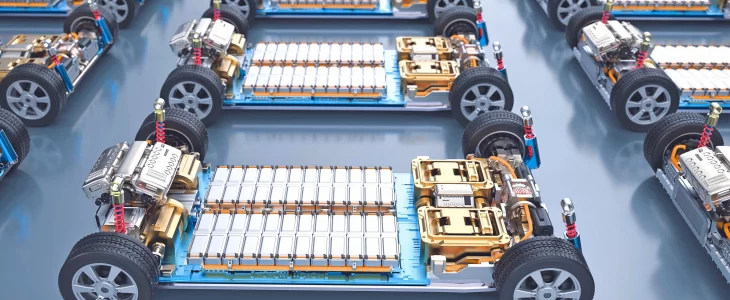
The Future of Battery Technologies for Electric Vehicles

The electric vehicle (EV) sector has witnessed remarkable growth in recent years, driven by advancements in battery technologies that enhance efficiency, safety, and sustainability. As the demand for EVs continues to surge, the need for innovative battery solutions becomes increasingly pressing. This article explores the future of battery technologies for electric vehicles, focusing on emerging chemistries, market trends, and the potential impact on performance and adoption.
-
Current State of Battery Technologies
1.1 Overview of Existing Technologies
Lithium-ion batteries dominate the EV market due to their balance of energy density, cost, and safety. These batteries have enabled the proliferation of electric vehicles, but they come with limitations, including short life cycles and potential overheating issues. As automakers and researchers look toward the future, several alternative chemistries are being explored.
1.2 Key Players and Innovations
Notably, companies like Tesla, Volkswagen, and Toyota are at the forefront of research and development in battery technologies. Tesla’s advancements in battery cell design and manufacturing processes, coupled with partnerships for battery production, position it as a critical player in the EV battery landscape. Innovations are also emerging in solid-state batteries and lithium-silicon technologies, which promise improved performance and safety.
-
Emerging Battery Technologies
2.1 Solid-State Batteries

Solid-state batteries represent a significant shift from traditional lithium-ion technologies. They utilize a solid electrolyte instead of a liquid one, which reduces the risk of leaks and fires while improving energy density. Recent research has shown that solid-state batteries can potentially double the energy density of current lithium-ion batteries, offering safer and quicker charging options.
2.1.1 Advantages of Solid-State Batteries
Higher Energy Density**: Solid-state batteries have the potential to achieve energy densities of over 500 Wh/kg, compared to around 200 Wh/kg for conventional lithium-ion batteries.
Increased Safety**: The absence of flammable liquid electrolytes reduces the risk of thermal runaway, making these batteries safer for consumer use.
Longer Lifespan**: Solid-state batteries can endure more charge cycles without significant degradation, enhancing their viability for long-term applications.
2.1.2 Challenges to Overcome
Despite their advantages, solid-state batteries face challenges in manufacturing scale and cost. The complexity of producing these batteries at a competitive price point remains a hurdle. Additionally, dendrite formation during charging must be addressed to ensure reliability. Leading manufacturers, including Toyota and QuantumScape, are actively pursuing solutions to demonstrate market readiness by the late 2020s.
2.2 Lithium-Silicon Batteries
Lithium-silicon (Li-Si) batteries are another promising alternative to conventional lithium-ion batteries. These batteries can significantly increase energy density and capacity by integrating silicon anodes.
2.2.1 Benefits of Lithium-Silicon Batteries
Higher Capacity**: Silicon anodes can theoretically increase the capacity of lithium-ion batteries by up to ten times, enabling longer driving ranges for electric vehicles.
Cost Reductions**: As research progresses, the use of silicon and improvements in battery management systems are expected to lower costs while enhancing performance.
2.2.2 Limitations to Address
While Li-Si batteries offer exciting potential, they are not without challenges. Silicon expansion during charge and discharge cycles can lead to material failure if not adequately managed. Ongoing research is required to stabilize silicon anodes and improve the battery’s cycle life.
-
Future Trends in Battery Technologies
3.1 Recycling and Sustainability
As battery production ramps, recycling, and sustainability become focal points in the EV industry. The demand for lithium-ion battery recycling is projected to grow as battery collection and reuse regulations become stricter. Technologies that enable closed-loop recycling systems can significantly reduce environmental impacts while supporting material supply chains.
Closed-Loop Recycling**: Innovations to reclaim valuable materials such as lithium, cobalt, and nickel from used batteries are essential for sustainable EV production.
3.2 Battery Management Systems
Advancements in battery management systems (BMS) are pivotal for optimizing battery performance and longevity. AI-powered BMS can monitor battery health, predict failures, and enhance charging efficiency, reducing downtime and maintenance costs.
Smart Charging Technologies**: Intelligent charging systems that adjust power levels based on battery state and temperature can further prolong battery life and improve user experience.
-
Market Dynamics and Adoption
4.1 Economic Factors
The economic landscape for battery manufacturing is shifting rapidly. As the price of lithium-ion batteries continues to decline, the overall cost of EVs is projected to fall, making electric vehicles more accessible to a broader consumer base. Market research indicates that battery prices are expected to drop below $100 per kWh in the coming years, facilitating mass adoption.
4.2 Regulatory Influences
Government policies to reduce carbon emissions are accelerating the transition to electric vehicles. Incentives for EV purchases, stricter emission regulations, and investments in charging infrastructure are essential for establishing a robust market for battery technologies.
Government Incentives**: Financial support for EV purchases and infrastructure development can significantly enhance consumer adoption rates and promote battery innovation.
-
Predictions for 2030
5.1 Dominant Technologies
While lithium-ion batteries will remain the predominant technology in the near term, solid-state and lithium-silicon batteries are positioned to take market share as challenges with cost and scalability are resolved. Emerging technologies may see their market share grow from single digits to significant percentages by 2030.
5.2 Market Growth Projections
The global battery market is expected to quadruple by 2030, driven by increased demand for electric vehicles and advancements in battery technologies. Major manufacturers are planning expansions and innovations to meet this foreseeable demand.
-
Conclusion
The future of battery technologies for electric vehicles is both promising and transformative. With ongoing advancements in solid-state and lithium-silicon technologies, the industry is poised to overcome present limitations and capitalize on the growing EV market. As battery performance improves, costs decrease, and sustainability initiatives take root, the electric vehicle landscape will profoundly stem the needs of modern consumers.
By embracing new battery technologies, automakers can enhance vehicle range, safety, and affordability, fostering broader adoption of electric vehicles and paving the way for a greener, more sustainable future.
—
This article provides a comprehensive overview of the promising future of battery technologies for electric vehicles. It integrates insights from various industry reports and expert opinions regarding technological advancements, market dynamics, and future predictions, showcasing the critical role of battery innovations in driving the electric vehicle revolution.
Sources:
[1] Next-Gen Batteries to Power Up Electric Vehicle Installed Base to …, https://www.industryweek.com/technology-and-iiot/article/22028055/next-gen-batteries-to-power-up-electric-vehicle-installed-base-to-100-million-by-2028
[2] Five Predictions for the 2030 EV Battery Market | IndustryWeek, https://www.industryweek.com/leadership/change-management/article/55236103/five-predictions-for-the-2030-ev-battery-market
[3] Beyond lithium-ion: Exploring next-gen battery technologies – EDN, https://www.edn.com/beyond-lithium-ion-exploring-next-gen-battery-technologies/
[4] Harnessing the promise of ultracapacitors for next-gen EVs – EDN, https://www.edn.com/harnessing-the-promise-of-ultracapacitors-for-next-gen-evs/
[5] Solid-state EV batteries are closer than you think – Engineering.com, https://www.engineering.com/solid-state-ev-batteries-are-closer-than-you-think/
[6] Solid-state batteries are finally making their way out of the lab, https://www.freethink.com/hard-tech/future-of-solid-state-batteries
[7] Solid State Battery Tech For EV Cars: Challenges Lie Ahead, https://www.motortrend.com/features/solid-state-ev-car-batteries-challenges/
[8] Tesla Fires Sound Alarms About Safety of Electric-Car Batteries …, https://www.industryweek.com/technology-and-iiot/emerging-technologies/article/22027605/tesla-fires-sound-alarms-about-safety-of-electric-car-batteries